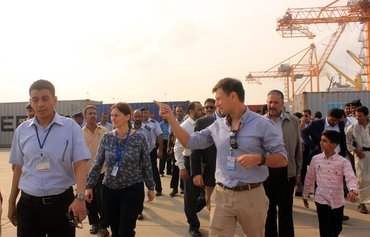A ceasefire agreement for the Yemeni port of al-Hodeidah reached last week between the government and the Iran-backed Houthis (Ansarallah) will spare the city and boost chances for comprehensive peace, officials and residents said.
At the conclusion of week-long, UN-brokered peace talks in Sweden, the warring sides on Thursday (December 13th) announced an immediate ceasefire in al-Hodeidah province and the ports of al-Hodeidah, Salif and Ras Issa.
The deal, set to come into effect Tuesday, calls for the removal of all military manifestations from the city and a mutual redeployment of forces from al-Hodeidah and the ports of Salif and Ras Issa, to agreed upon locations.
This is to occur within 45 days from the time the ceasefire enters into force.
![This picture, taken December 14th, shows a view of a market in the Red Sea port city of al-Hodeidah. [Abdo Hyder/AFP]](/cnmi_am/images/2018/12/17/15812-Yemen-Hodeida-market-600_384.jpg)
This picture, taken December 14th, shows a view of a market in the Red Sea port city of al-Hodeidah. [Abdo Hyder/AFP]
The truce agreement also stipulates that security of the city and the three ports will be the responsibility of local security forces, in accordance with Yemeni law.
A joint redeployment co-ordination committee will be established, to be chaired by the UN, and the UN also will play a leading role in supporting the Yemen Red Sea Ports Corporation in the management of the three ports.
The negotiations also included an agreement on the exchange of more than 15,000 prisoners, and on the opening of humanitarian corridors to Taez.
Sporadic clashes continue
Negotiations failed, however, to reach an agreement on reopening the Sanaa airport or on economic measures needed to spare the population further hunger, AFP reported.
Residents of al-Hodeidah and the surrounding areas also have reported fierce fighting and airstrikes in recent days, as clashes continued.
At least 29 combatants, including 22 Houthis, were killed Saturday night in al-Hodeidah province, a pro-government military source told AFP.
Two al-Hodeidah residents reached by telephone told AFP they could hear intermittent clashes to the east and south of the city on Monday, while a pro-government military official also said there had been sporadic clashes.
Doctors Without Borders voiced alarm about "the continuous fighting", urging warring parties "to respect the presence of civilians and health infrastructures".
UN envoy Martin Griffiths said Sunday that the UN was working with both sides to ensure the ceasefire accord was "implemented timely and properly".
Deployment of UN observers
In a Friday briefing to the UN Security Council, Griffiths called for the immediate deployment of UN observers to monitor the ceasefire implementation in al-Hodeidah city and port.
Speaking via video link, Griffiths said Maj. Gen. Patrick Cammaert, who is retired from the Dutch military, had agreed to lead the monitoring component of the agreement. He is expected to arrive in the region by mid-week.
The UN is expected to form a committee to oversee the re-deployment in al-Hodeidah and the other ports, and also will oversee the ceasefire and withdrawal of militias as per the al-Hodeidah agreement.
"Sparing the people of the city and the port the woes of war is the positive thing," said deputy al-Hodeidah governor Walid al-Qadimi.
"The result of this agreement will be reflected on the return of people who were displaced by war," he told Al-Mashareq. "It also will help facilitate the delivery of humanitarian assistance and the payment of salaries."
Residents begin to return
Some residents began to return to the city after the agreement.
"I have decided to return with my family to al-Hodeidah after the ceasefire was announced," displaced city resident Emad al-Jadi told Al-Mashareq.
"I will return home after eight months [of displacement]," he said. "Although returning is risky due to a lack of guarantees for the implementation of the agreement, it is still better than living in Sanaa as a displaced person."
Political analyst and al-Hodeidah native Wadie Atta said the ceasefire agreement alone is not enough.
"Any agreement or settlement which does not stipulate the departure of the Houthis from the city means that the UN consents to the continued humanitarian suffering of four million people," he said.
"Everyone must know that the Houthis are just temporary militias who have overrun al-Hodeidah and other provinces with the force of weapons, and that their presence can in no way be legitimized," he added.
The most significant part of the agreement is the humanitarian aspect and the cessation of hostilities, said Deputy Human Rights Minister Nabil Abdul Hafeez.
"Although the legitimate forces were very close to liberating the city, they chose to spare the people more destruction," he told Al-Mashareq.
"The winner in this agreement is the Yemeni people," he said.

![A Yemeni fighter of the pro-government forces walks with a rifle in the Red Sea port city of al-Hodeidah on December 15th. [AFP]](/cnmi_am/images/2018/12/17/15813-Yemen-fighter-Hodeida-600_384.jpg)






All this is old and known news.
Reply3 Comment(s)
Yes.
Reply3 Comment(s)
Don’t deceive people; these are just words and illusions that will go with the wind. Only the right will remain, and only the strong will rule!
Reply3 Comment(s)